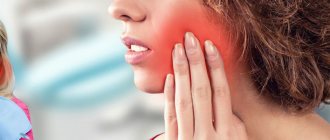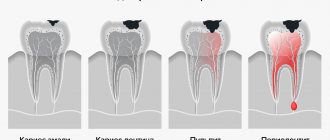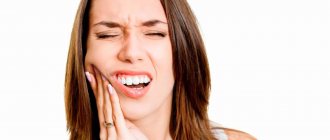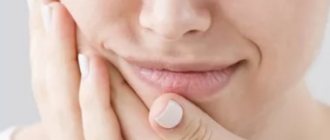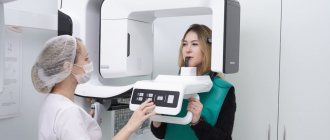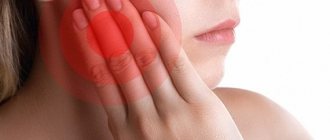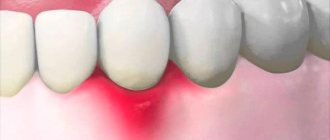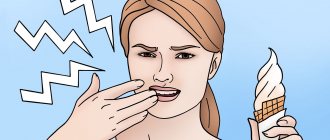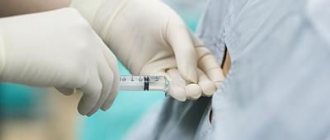Author of the article:
Soldatova Lyudmila Nikolaevna
Candidate of Medical Sciences, Professor of the Department of Clinical Dentistry of the St. Petersburg Medical and Social Institute, Chief Physician of the Alfa-Dent Dental Clinic, St. Petersburg
Many of you are probably familiar with this unpleasant state: as soon as you bite off a piece of chocolate or take the first sip of aromatic coffee, your teeth begin to “ache.” And let's be honest, "breaking" is an understatement. The jaw literally cramps with pain, and the skin instantly breaks out in goosebumps.
We’ll talk today about why the jaw suddenly begins to “ache” and the teeth begin to ache, and most importantly, how to get rid of such manifestations in the present and prevent them in the future.
How can discomfort manifest itself?
In the language of dentists, this phenomenon is called hypersensitivity or hyperesthesia. And the main causes of discomfort are abrasion and cracks of the enamel.
Pain from so-called aching teeth can manifest itself in different ways. Some patients have pain in all rows at the same time, and in some patients only 2-3 teeth hurt. The following manifestations are characteristic of hyperesthesia:
- Sharp aching pain of uncertain localization. A person complains that “the whole jaw begins to ache at once.”
- Severe pain when eating sweet/hot/cold foods and drinks.
- Pain localized to a specific part, such as the front teeth or back molars.
Dentists classify enamel hypersensitivity in different ways - according to the degree of prevalence, stage of occurrence and origin.
According to the degree of prevalence, hyperesthesia is divided into two types:
- Localized.
Occurs in the area of one or more teeth. This type of aches is caused by carious cavities and wedge-shaped defects in the necks of teeth. Sensitivity can also be caused by grinding down the enamel to install crowns. - Generalized.
This sensitivity spreads throughout the entire jaw. Hyperesthesia is provoked by periodontal tissue diseases, blooming caries and enamel erosion.
According to the causes of occurrence, hyperesthesia can be classified as follows:
- Hypersensitivity due to dental damage - caries, grinding and erosion of enamel.
- Hypersensitivity due to exposure of necks, tooth roots, as well as systemic pathologies in the body.
They are divided according to the stage of occurrence:
- 1st degree. Teeth ache due to temperature changes; the electrical excitability of dentin does not exceed 8 microamps.
- 2nd degree. Dentin begins to react not only to temperature, but also to chemical stimuli. Maximum electrical excitability is 5 microamps.
- 3rd degree. The teeth begin to cramp under any irritant, electrical excitability increases to 3 microamps.
Symptoms of neurosis
Pathology manifests itself both at the physical and psycho-emotional levels. Physical symptoms include increased sweating, rapid heartbeat, chest pain and dry mouth, headaches, blurred vision, tremors of the limbs, skin rashes, and menstrual irregularities in women.
Psychological symptoms: a feeling of loss of control, a feeling that the person is “going crazy”, fear of sudden death, excessive worry, high sensitivity and vulnerability.
- Irritability;
- Constant feeling of fatigue and apathy;
- Increased sensitivity;
- Social isolation;
- Frequent and unexpected mood swings;
- Disturbances in sleep and wakefulness;
- Loss of interest in life or certain areas of it.
It is the constant feeling of anxiety for one’s life or the lives of loved ones that causes insomnia in a person. Problems with sleep do not allow the body and nervous system of those suffering from neurasthenia to fully rest. This, in turn, further intensifies all the symptoms listed above.
Therefore, for insomnia, experts recommend several simple and effective rules:
- Follow a daily routine, that is, try to fall asleep and wake up at the same time;
- Play sports, giving the body a light load;
- Be in the fresh air more often;
- Reduce the number of drinks containing caffeine;
- Eat light foods to avoid stomach discomfort.
For what reasons does neurosis develop?
- Strong mental activity;
- Prolonged psychological distress and anxiety;
- Psychological pressure due to the inability to solve life problems;
- Long-term loneliness and problems in the personal sphere of life;
- Traumatic event in life: loss of a loved one, difficult divorce, difficult financial situation, if the person has been subjected to emotional and physical abuse, etc.;
- High expectations. In this case, the person cannot achieve the desired goal and experiences a feeling of an impossible plan;
- Psychological trauma received in childhood: humiliation or beating from peers and parents, example of a bad lifestyle from adults, harsh upbringing;
- Failure to comply with work and rest schedules.
Causes of toothache
As we have already said, the main reason for such painful sensations is the thinning of the enamel. Hyperesthesia can also develop due to:
- dentin reactions;
- allergies to dental medications;
- periodontal diseases;
- mechanical damage to enamel;
- hereditary predisposition.
Let's look at each cause of the problem in more detail.
How might the nerve react?
Often teeth due to deep caries and pulpitis. And such “ache” will very soon turn into more serious, excruciating pain, not only when cleaning and eating hot or cold food, but also in a calm state, both day and night.
With pulpitis, a cavity develops in the coronal part and root canals of the teeth, where the nerve fibers are located, which over time fills with pus and blood. And although the epicenter of inflammation in this case is the nerve, the patient may initially complain that the whole row of teeth is “aching.” The sensations are localized in one tooth a little later, the pain becomes unbearable and requires the intervention of a dentist.
Types of trigeminal neuralgia
Trigeminal neuralgia is divided into two types. The first, the so-called true trigeminal neuralgia, is a holistic disease caused in most cases by compression of the nerve or disruption of the blood supply. The second type - secondary trigeminal neuralgia - is a symptom of a general disease of the body. It could be a tumor or a serious infection.
In most cases, doctors diagnose inflammation of one of the processes of the trigeminal nerve, but in some situations inflammation of two or three processes occurs at once. Inflammation can affect either one side of the face or both, and in different combinations.
Thinning enamel
Tooth enamel can become thinner for a variety of reasons, such as:
- improper bleaching or poor-quality professional cleaning;
- using brushes that are too hard;
- using pastes with abrasives that expose the enamel to chemical and mechanical stress;
- vitamin deficiency (the pain in this case is characterized by an aching, twitching character and manifests itself during cleaning, rinsing the mouth, eating and drinking).
What to do when cracks appear in the corners of your mouth? perhaps these are jams?
Such cracks are painful, unpleasant, and unsightly. They are quite difficult to get rid of. Many people think that the occurrence of a jam is associated with a denture. In principle this is true. Quite often, dentures cause jamming. This may occur because the prosthesis is not installed correctly or is not properly maintained. If the prosthesis is large and the mouth gap is small, then when inserting the prosthesis, tears may appear that become infected. Jams may form in these places.
Dentin reaction
Dentin is the hard tissue of the tooth underneath the enamel. This is a layer that, after damage, can allow irritants to pass into the nerve zones. Dentin is destroyed during advanced stages of caries, and can also occur with inadequate dental treatment if an infection develops under a filling.
If teeth ache for this reason, the patient feels a drilling, sharp pain, similar to the sensations of purulent pulpitis.
In very rare cases, teeth ache due to the patient’s individual intolerance to certain dental medications, after visiting a doctor. In this case, the pain is accompanied by itching in the gums and palate.
“Just like a vegetable.” Why do people continue to get sick a year after Covid?
MOSCOW, September 29 – RIA Novosti, Alfiya Enikeeva. According to various sources, from 20 to 75 percent of those who have recovered from COVID-19 still suffer from its consequences six months later. The main symptoms include chronic fatigue, shortness of breath, hair loss, panic attacks, and sleep problems. Doctors call this post-Covid syndrome. In Russia, every fifth patient is diagnosed with it. How these people live and deal with complications is in the material of RIA Novosti.
“I couldn’t do anything”
I got sick with Covid almost a year ago, on October 29th.
A nurse from the clinic came and took a test for coronavirus. It turned out to be negative, but ten days later my temperature rose, my nasopharynx became dry, and the vessels in my nose began to ache. My whole body ached—muscles, bones, joints. Otherwise, everything developed according to not the worst scenario: the temperature did not exceed 37.8 for only two days, and the saturation did not drop. A CT scan showed four percent lung damage. But there was a very strong tachycardia mixed with panic attacks. At rest, the pulse reached 120. And so it is until now. Plus, problems appeared with blood vessels in the legs and eyes. I even thought that I had a retinal tear due to oxygen starvation and vascular damage. But the ophthalmologist found nothing, thank God. He prescribed drops, but they didn’t help - my eyeballs seemed to hurt from the inside. I consulted with different doctors, no one could really say anything. Prescribed medications. Some only made things worse, while others had no effect at all. I decided to take one drug, an anticoagulant, on my own, the minimum dose. The doctors said that it was not needed: the coagulogram was normal, fibrinogen and d-dimer too. But at my own peril and risk I started drinking it, because my condition was like this: I just lay there like a vegetable and couldn’t do anything.
After the first pill I felt better - as if I had emerged from the water. The swelling decreased, the fog in the head went away, and - what is very important - the tachycardia disappeared, it just went away. I have been taking this drug for nine months. I tried several times to get off him, but in vain. If I don’t take the pill, the tachycardia returns. There was still total chronic fatigue. I get tired very quickly. In fact, I can only walk. I am unable to do any exercises. Cleaning the house is already a heavy physical activity. I almost stopped cleaning the floor; I use a robot vacuum cleaner.
Since I am an individual entrepreneur, I was able to organize a very light work schedule for myself. For the first three months, until January, I didn’t work at all. Business just stopped. No income - the airbag was eaten away.
“I had to quit my job”
Alexander Korchevny, 39 years old, Ekibastuz, Kazakhstan.
Now he is being treated at the Novosibirsk Center for the Prevention of Thrombosis. I fell ill at the beginning of June 2022, and was infected, presumably, at work. Took a PCR test - positive. I was sent into voluntary isolation in an infectious diseases hospital for 18 days. As it turned out, it was in vain: one after another, relatives fell ill with Covid.
In the hospital there was no special treatment, only observation, since the disease was not severe. There was a slight malaise for about three days, then for two days the temperature was difficult to bring down to 38. Smells disappeared, appetite decreased, and problems with sleep appeared. The first “call” was ten days after the diagnosis. An unexpected tachycardia began, a panic attack began and the pressure jumped. They gave me an injection of aminophylline. It seems to have gotten a little better.
He left the hospital neither sick nor healthy. I really wanted to go home after isolation. But things only got worse. New symptoms related to nerves and blood vessels were gradually added. Endless visits to doctors began. None of them fully understood what was wrong or how to treat me. All tests are more or less calm. Over the course of a year, I took courses with five neurologists in different cities. Everyone made two diagnoses: vegetative-vascular dystonia and chronic fatigue syndrome. Everyone hinted at a psychologist. I also visited him, he did not reveal any violations.
All this year the disease develops in waves: at times you feel well, at times you lie down and cannot get up. After courses of treatment there were minor improvements, but overall my health was far from normal. In the last 12 months I have taken more medications than I have ever taken in my entire life. I had to quit my job due to endless sick leave. I asked the local therapist what to do in such a situation, because I am disabled, but she just threw up her hands.
“My hair was coming out in clumps”
Nailya Vagizova, 38 years old, Kazan On June 1st I felt unwell.
I called the doctor. He said it was an acute respiratory infection, prescribed an antibiotic, an antiviral, vitamins, but it didn’t get any better. And already on the ninth I ended up in the hospital. There were problems with breathing. She spent five days in intensive care. Lung damage is more than 75 percent. Doctors told relatives that everything should be prepared for the worst. But I pulled myself together and began to get out. My husband brought drugs that the hospital did not have, and thanks to this I survived. She was discharged on June 19th and recovery began: exercises, proper nutrition, pills. In theory, they should be given to everyone for free, but they ran out on me, and my family bought everything. Three and a half months later, I still don't feel healthy. About two months after discharge, my hair began to fall out, just in clumps. Constant pain in my legs, aching joints in my arms. When I left the hospital, no one warned me that it could take so long and the recovery would be so difficult. There is no help from state medicine now. The doctors at the clinic don't say anything. I myself take all the tests for a fee, take vitamins, collect information on the Internet from people who have also been ill. I am a laboratory doctor by profession, so I began to independently understand the topic and control my condition.
“It’s easier for me to think that it’s not Covid”
Evgenia Yurfeld, Moscow I am not quite a standard post-Covid person.
I was given the third group of disability even before Covid, for the main disease. Atrial fibrillation provoked three strokes and bradycardia; a pacemaker had to be installed. So I started fighting dizziness, arrhythmia and disturbances in the functioning of the vestibular apparatus long before Covid. I got sick with coronavirus at the end of last fall, but in December I had a good test. The doctor immediately warned me about post-Covid. She herself suffered from COVID-19 and knows what it is. Now from time to time I experience some typical symptoms, but I consciously attribute them to the underlying disease. It's easier for me.
I am constantly under medical supervision. The doctor visits me regularly. They give me antiplatelet drugs for free, and I get a rather expensive anticoagulant at the pharmacy. Subspecialists come to your home to inspect it and take tests. But I rarely bother the clinic with requests. I learned to cope with attacks on my own. Overall, I just hope that sooner or later the body will adapt to someone else’s virus. If you have still survived with such a list of diseases and even suffered from Covid, then you have to thank your genes and your guardian angel.
“The main thing is to trust the doctors”
Valentina Nelyubova, 59 years old, Moscow I was diagnosed with Covid in January.
I was very sick. I almost went to another world. I was treated by private doctors at home for two weeks. Afterwards I was treated absolutely free of charge under the policy. And also very good. Plus, the family doctor constantly monitored me. She is also shocked: how did I survive with such bad tests and my condition is below par. When I was sick, I realized: the main thing is that there are good doctors nearby, and it doesn’t matter whether they pay or not. It is important how they are treated, and patients must trust doctors. Now, thank God, it's all over. I recovered from Covid for several months, it’s a long story. But everything ended well. I am very grateful to the doctors of the branch of the Alekseev Day Hospital at Polyclinic 121, in South Butovo. They really help cope with post-Covid syndrome and depression. Many people are afraid of mental hospitals. This is some kind of misinterpretation, misunderstanding. But only qualified psychologists can get to post-Covid problems and help. At least they helped me.
“This is already an independent disease”
According to researchers from Sechenov University, in Russia more than 20 percent of patients who have suffered coronavirus infection suffer from post-Covid syndrome.
Among the most common complaints are weakness (more precisely, fatigue), shortness of breath, anxiety, depression, sleep problems and hair loss. “Post-Covid syndrome (PCS) is a symptom complex that occurs as a result of a coronavirus infection. This is a very broad concept, which may include damage to the nervous, cardiovascular systems, gastrointestinal tract, and muscle atrophy. There may even be some mental manifestations. Its duration is a purely individual matter. For some, the main symptoms are resolved in a mild form within two to three months. For others, they last up to a year or even more. It’s too early to talk about maximum terms. We are just observing this disease and studying it. In my experience, patients last the longest with various neurological disorders, lesions of the peripheral nervous system,” Professor Evgeniy Achkasov, head of the department of sports medicine and medical rehabilitation at Sechenov University, expert of the National Health League, told RIA Novosti.
According to him, PCS symptoms, their severity and duration often depend on the severity of COVID-19, but not always. Thus, among the patients there are many people who suffered from Covid itself relatively easily, but have been suffering from its complications for more than a year.
“The basis of rehabilitation programs for post-Covid syndrome is breathing exercises, cyclic physical exercises, and cardioprotection. We strive to protect the heart muscle both with medication and with various physical therapy options. We use massages and pressure chambers. Quite a wide range. But we must understand that it is often very difficult to rehabilitate such patients at home. It's better to be hospitalized. Post-Covid syndrome is already an independent disease, and it must be taken very seriously,”
- the professor emphasized.
However, if the symptoms of ACL are pronounced, and there is no opportunity to see a doctor, then experts advise doing Nordic walking. This type of physical activity has a good effect on the cardiovascular and respiratory systems. But in no case should you inflate balloons to restore lung volume, so as not to cause additional pulmonary injury.
Link to publication: ria.ru
How to relieve pain?
If aches and pain in your teeth caught you in the middle of the night, and you only made an appointment with the doctor the day after tomorrow, try to relieve the painful sensations for a while. Here are some popular and effective ways to temporarily soothe aching teeth.
- Acupressure
will help relieve discomfort for a couple of hours. Try massaging the grooves between the phalanges of the index and thumb, the base of the ears, and the area between the cheekbone and lower jaw. - Rinse
. For an anesthetic rinse, a decoction of chamomile, St. John's wort, lemon balm, mint or oregano is suitable. Just pour 1-2 tablespoons of the dry plant with a glass of boiling water, and then keep the composition in a water bath for 20 minutes. If there are no medicinal herbs in your home medicine cabinet, rinse your mouth with a salt solution. Dissolve a teaspoon of the substance in a glass of water and begin therapy. - Painkillers
will help you rest before your visit to the doctor and relieve aching teeth. Dentists advise choosing new painkillers with each new attack of pain - Nurofen, Analgin, Ketanov, paracetamol, aspirin. However, do not under any circumstances overdo it with pills! Firstly, these drugs are addictive, and secondly, they have a bad effect on the liver, kidneys, gastrointestinal tract and other systems in the body. - Clove, mint and sea buckthorn oils
will help relieve pain and even relieve swelling of the gums. For pain relief, it is enough to soak cotton swabs and cover the sore teeth. Tampons should be changed every 2 hours. - Propolis
is an excellent natural anesthetic, similar in action to novocaine. To pacify dental aches and pain, you can wipe the gums with an alcohol solution of propolis or moisten cotton wool with it and cover the sore tooth. Some dentists advise using propolis in plates: you can simply cover the hole with a piece of the substance or put propolis on the gum near the tooth. The product is prohibited for patients who suffer from allergies to honey and other bee products. - Garlic,
according to patient reviews, helps to forget about the painful aches for a couple of hours. You can use a cut or ground clove, applying it to a sore tooth, or chew garlic with black bread and hold it in your mouth. This vegetable warms the skin, so it can be used as an irritant for acupuncture points. To soothe a toothache, a paste of two cloves of garlic should be applied to the inside of the wrist on your hand (the opposite side on which the tooth hurts). The medicine is fixed on the skin with a bandage and lasts for several hours. - radishes
have been used to treat toothache and gum inflammation. To prepare a natural analgesic, you need to wash the vegetable, peel it from the skin and grate it on a fine grater, and then pour 2 tablespoons of the pulp with 0.5 liters of boiling water. To relieve pain with the composition, you need to rinse your mouth every hour. - Plantain root
is an excellent summer analgesic. Simply rinse it and apply it to the sore tooth. After 20-30 minutes the pain will go away.
For toothache of infectious origin, Asepta Active mouth rinse is an effective analgesic, antibacterial and anti-inflammatory agent. This product combines a combination of benzydamine and chlorhexidine, which not only has a pronounced antibacterial effect, but also prevents inflammation and bleeding of the gums, freshens breath and prevents the formation of plaque.
Treatment of inflammation of the trigeminal nerve
The first stage of treatment for inflammation of the trigeminal nerve is medication. It is aimed at reducing the strength and frequency of pain in the patient. Most often, doctors prescribe anticonvulsants to a patient suffering from trigeminal neuralgia. Sedatives are also used.
Physiotherapeutic procedures, as well as resorption therapy to relieve the inflammatory process, have a good therapeutic effect. Next, the doctor may recommend the use of laser treatment, in which the laser is directed cutaneously to the area where the processes of the trigeminal nerve exit the skull.
Our clinic is located in the same building as the multidisciplinary clinic “Diamed on Shchelkovskaya”, where special conditions for receiving physiotherapeutic procedures are organized for dental patients. The clinic’s physiotherapy room is equipped with modern equipment, including a laser physiotherapy device, with which you will feel relief after the first procedure. The pain will go away and you can return to normal eating. Make an appointment with a dentist by calling 8 or using the online appointment form. The doctor will make an accurate diagnosis and refer you for treatment.
If you are in severe pain, but for some reason you have not yet made an appointment with us, then it can be relieved with folk remedies. Take one tablespoon of yarrow, pour a glass of boiling water, let it brew for one hour and strain. The tincture should be taken one tablespoon before meals three to four times a day.
What is absolutely forbidden to do?
In order not to double the painful sensations of aching in the jaw, it is important to adhere to several rules before visiting a doctor:
- Regularly clean the oral cavity of food debris; sometimes it is particles from lunches and dinners that often become the cause of especially severe pain in pulpitis and periodontitis.
- Never chew on the side of the affected tooth.
- Heating a sore spot is strictly prohibited. Any hot compresses increase blood flow and increase pain.
- Try not to be in a lying position; this position activates blood circulation in the periodontal tissues and increases pressure on them.
We have listed the main ways to relieve toothache. However, these methods, with all their diversity, will not help cure the cause of the unpleasant manifestation and are only a temporary measure. As soon as you feel your teeth hurting, make an appointment with the dentist. Believe me, the sooner you start treatment, the faster and cheaper you will get rid of painful sensations.
What measures should be taken first?
First of all, it is necessary to treat all diseased teeth, remove tartar, poorly installed crowns or dentures. Smokers will have to quit smoking or reduce the number of cigarettes to a minimum. If there is no improvement, you need to make a scraping in order to determine the type of causative agent of the disease: staphylococcus, streptococcus or yeast, and conduct a laboratory blood test to determine the content of vitamin B2.
If a fungus is detected, nystatin or levorin, as well as other antifungal drugs, are prescribed. Lubricate problem areas with 1% erythromycin ointment or 5% mercury ointment. Oxycor and a 10% glycerin solution of borax are also used. However, you should not self-medicate.
The doctor will select the medications that are ideal for the patient, taking into account the characteristics of the disease and attitude to medications. To improve the patient's condition, you can use an infusion of oak bark or alder cones; these infusions are good at disinfecting inflamed areas.
Vitamins, rosehip orphans, and medicinal brewer's yeast should be taken orally. Include more vegetables and fruits in your food, limit the consumption of salty, sour, and spicy foods as much as possible. Consume more dairy products and eat boiled meat. The amount of sweets should be reduced to a minimum. To avoid recurrence of jamming and the negative impact of stress on the condition of teeth , you should follow the rules of personal hygiene.
Stress and teeth, jams, causes and treatment of jams
Clinical researches
Repeated clinical studies have proven that the two-component mouth rinse ASEPTA ACTIVE more effectively combats the causes of inflammation and bleeding compared to single-component rinses - it reduces inflammation by 41% and reduces bleeding gums by 43%.
Sources:
- The effectiveness of the use of Asept “adhesive balm” and Asept “gel with propolis” in the treatment of chronic generalized periodontitis and gingivitis in the acute stage (Municipal Dental Clinic No. 4, Bryansk, Kaminskaya T. M. Head of the therapeutic department Kaminskaya Tatyana Mikhailovna MUZ City Dental Clinic No. 4, Bryansk
- Study of the clinical effectiveness of treatment and prophylactic agents of the Asepta line in the treatment of inflammatory periodontal diseases (A.I. Grudyanov, I.Yu. Aleksandrovskaya, V.Yu. Korzunina) A.I. GRUDYANOV, Doctor of Medical Sciences, Prof., Head of Department I.Yu. ALEXANDROVSKAYA, Ph.D. V.Yu. KORZUNINA, asp. Department of Periodontology, Central Research Institute of Dentistry and Maxillofacial Surgery, Rosmedtekhnologii, Moscow
- The role of anti-inflammatory rinse in the treatment of periodontal diseases (L.Yu. Orekhova, A.A. Leontyev, S.B. Ulitovsky) L.Yu. OREKHOVA, Doctor of Medical Sciences, Prof., Head of Department; A.A. LEONTIEV, dentist; S.B. ULITOVSKY, Doctor of Medical Sciences, Prof. Department of Therapeutic Dentistry of St. Petersburg State Medical University named after. acad. I. P. Pavlova
- Report on the determination/confirmation of the preventive properties of personal oral hygiene products “ASEPTA PLUS” Remineralization doctor-researcher A.A. Leontyev, head Department of Preventive Dentistry, Doctor of Medical Sciences, Professor S.B. Ulitovsky First St. Petersburg State Medical University named after. acad. I.P. Pavlova, Department of Preventive Dentistry
Causes of inflammation of the trigeminal nerve
Doctors believe that the main cause of inflammation of the trigeminal nerve is compression of it either inside the skull or outside it. Inside the skull, the trigeminal nerve can be compressed as a result of the formation of tumors, in most cases resulting from some kind of head injury.
Also a fairly common cause of inflammation of the trigeminal nerve is internal venous or arterial displacement.
Other causes of trigeminal neuralgia include:
- the presence of a chronic inflammatory process, viral or bacterial infection in the body;
- herpes infection (herpes);
- a brain tumor;
- scarring in the brain stem;
- failure of anesthesia during treatment or tooth extraction.
Most often, inflammation of the trigeminal nerve affects women at pre-retirement and retirement age (usually from fifty to seventy years). If trigeminal neuralgia is diagnosed in a young man or girl, then most likely its cause is a change in the arteries of a sclerotic nature or a strong dilatation of blood vessels.
